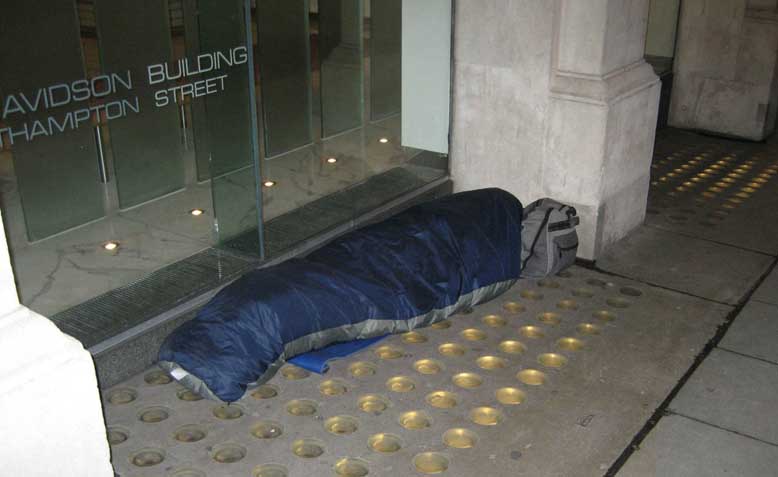 Homeless sleeper in Covent Garden. Photo: WIkimedia Commons
Homeless sleeper in Covent Garden. Photo: WIkimedia Commons
This winter people are dying needlessly. Rosa Luxemburg reminds us that politics is about more than negotiations between competing states.
A homeless man in his 50s was found frozen to death in his tent in Ranelagh, Dublin, yesterday.
Just 12 days ago Elaine Morrall, a 38-year-old mother of four, was found dead wrapped in a coat and scarf in a freezing house in Runcorn, England.
Not only does it underscore the common interests and crises facing working people in both Ireland and in Britain, it also brought to mind some words by the Polish-German socialist Rosa Luxemburg.
She wrote a powerful article in Gleichheit (Equality), the socialist women’s paper edited by Clara Zetkin, about the deaths of scores of homeless people on New Year’s Eve 1912.
They died from poisoned food.
It was on one level a piece of investigative social affairs reporting, not perhaps what Luxemburg is most famous for. She showed how the food full of dangerous bacteria had ended up through market mechanisms and cost-cutting in a homelessness hostel.
She goes on, however, to excoriate not just those features of the capitalist economy, but the culture which can turn a blind eye to the consequences – including even the culture of the official workers’ movement and those who are in better or more secure jobs and circumstances:
“… a wall is coming up, and rarely one thinks of the misery in the mud on the other side. And suddenly there is an event that upsets everything. Suddenly, the terrible ghost of misery pulls from the face of our society the mask of dignity, and reveals this pseudo-harmony…Suddenly, beneath the pale and intoxicating pretensions of our civilization, we discover the abyss of barbarism and brutality. Human creatures in the dirt, suffocating from their pains, panting, falling away, leaving their last infected breath.”
And she ends by chastising those in the social democratic (labour) movement who do not see these events as political, but rather as social affairs providing at best illustration for the proper business of politics conducted in parliaments, by government ministers, between governments and treated as “politics” by official society. Things like “Brexit negotiations”.
She recalls that after a massacre during the 1848 revolution in Germany:
“The day after… the Berlin workers lifted the dead bodies of the rebellion and bore them in front of the Palace, forcing the despotism to show its respect to the victims.”
And she concludes:
“Today, we have to raise up these poisoned bodies of the Berlin homeless, who are the flesh of our flesh and the blood of our blood, borne aloft by thousands of proletarian hands, and we carry them into this new year of struggle by shouting: ‘Down with the obscene social system that creates such horror!'”
There are housing and hospitals crises of similar dimensions on both sides of the Irish Sea.
Working people in Ireland and in Britain have no interest in being used by their respective governments in a squalid and dangerous political game over Brexit and how to secure capitalist interests on both islands.
They have every interest in fighting their respective governments and the neoliberal austerity which is hardwired into the EU.
The other thing that the governments in both London and Dublin have in common, along with the EU in Brussels, is a contempt for democracy. The two minority governments are desperate to avoid further elections in each country, and the Brussels bureaucracy reacts to popular democratic expression like a vampire faced with garlic. Look at Catalonia.
One prediction today is that the expected coldest December in seven years will result in 40,000 excess deaths.
There is a common working class and democratic answer in both Ireland and in Britain, and that is what the labour movement should press against Fine Gael, Fianna Fail, the Tories and the DUP.

